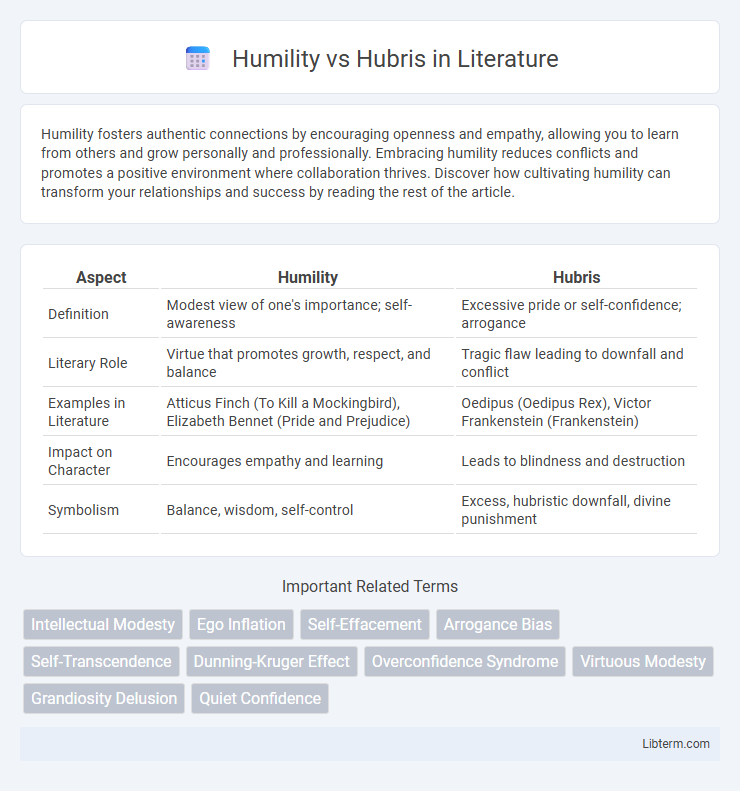Humility fosters authentic connections by encouraging openness and empathy, allowing you to learn from others and grow personally and professionally. Embracing humility reduces conflicts and promotes a positive environment where collaboration thrives. Discover how cultivating humility can transform your relationships and success by reading the rest of the article.
Table of Comparison
| Aspect | Humility | Hubris |
|---|---|---|
| Definition | Modest view of one's importance; self-awareness | Excessive pride or self-confidence; arrogance |
| Literary Role | Virtue that promotes growth, respect, and balance | Tragic flaw leading to downfall and conflict |
| Examples in Literature | Atticus Finch (To Kill a Mockingbird), Elizabeth Bennet (Pride and Prejudice) | Oedipus (Oedipus Rex), Victor Frankenstein (Frankenstein) |
| Impact on Character | Encourages empathy and learning | Leads to blindness and destruction |
| Symbolism | Balance, wisdom, self-control | Excess, hubristic downfall, divine punishment |
Understanding Humility: Definition and Core Concepts
Humility is the recognition and acceptance of one's limitations and imperfections, fostering an accurate self-awareness without arrogance. It involves valuing others' perspectives and maintaining openness to learning, which enhances personal growth and interpersonal relationships. Core concepts of humility include modesty, gratitude, and a balanced self-view, distinguishing it from hubris, which is characterized by excessive pride and overconfidence.
Exploring Hubris: Meaning and Implications
Hubris refers to excessive pride or self-confidence that often leads to a downfall, rooted in Greek tragedy and modern psychological studies. This overestimation of one's abilities can result in poor decision-making, alienation from others, and inevitable failure. Understanding hubris is crucial for developing emotional intelligence and maintaining balanced leadership.
The Historical Roots of Humility and Hubris
Ancient Greek literature and philosophy deeply explored the concepts of humility and hubris, with hubris often depicted as excessive pride leading to nemesis or divine retribution, as seen in works like Sophocles' tragedies. Humility, in contrast, was valued in various religious traditions including Christianity, where it symbolizes modesty and submission to divine will, promoting social harmony and personal growth. These foundational ideas continue to inform modern ethical discussions and cultural attitudes toward pride and humility.
Psychological Traits: Humble Minds vs. Arrogant Egos
Humble minds exhibit psychological traits such as self-awareness, openness to feedback, and emotional regulation, which foster healthy interpersonal relationships and adaptive thinking. Arrogant egos often display inflated self-esteem, resistance to criticism, and cognitive biases that impair judgment and increase conflict. Research in psychology links humility with greater empathy and resilience, while hubris correlates with defensive behavior and impaired social cognition.
The Impact of Humility in Leadership and Decision-Making
Humility in leadership fosters open-mindedness and a willingness to acknowledge mistakes, which enhances effective decision-making and team collaboration. Leaders who exhibit humility are more likely to seek diverse perspectives, encourage innovation, and build trust within their organizations. This approach reduces the risk of overconfidence and poor judgment often associated with hubris, leading to sustainable success and resilience.
Hubris and Its Consequences in Personal and Professional Life
Hubris, characterized by excessive pride and overconfidence, often leads to significant personal and professional setbacks such as damaged relationships, loss of trust, and career stagnation. In professional settings, hubris can result in poor decision-making, inability to accept feedback, and eventual failure due to misjudgment or alienation of colleagues. Recognizing hubris and cultivating self-awareness is essential to avoid these detrimental consequences and foster sustainable personal growth and successful leadership.
Humility in Relationships: Building Trust and Respect
Humility in relationships fosters trust and respect by encouraging openness, active listening, and empathy between partners. Demonstrating humility allows individuals to acknowledge mistakes and prioritize the needs of others, strengthening emotional bonds and reducing conflicts. Consistent humble behavior promotes a supportive environment where mutual understanding and cooperation thrive.
Hubris in Society: Examples from Politics and Culture
Hubris manifests in society through political leaders who overestimate their power, often leading to corruption scandals and loss of public trust, as seen in events like Watergate and authoritarian regimes. In cultural spheres, celebrities or influencers exhibiting excessive pride can spark controversies that damage reputations and influence public discourse negatively. This pervasive overconfidence undermines democratic institutions and promotes toxic environments, emphasizing the consequences of unchecked arrogance in both politics and culture.
Cultivating Humility: Practical Strategies for Growth
Cultivating humility involves embracing self-awareness and recognizing personal limitations to foster continuous growth. Practices such as seeking constructive feedback, reflecting on failures, and valuing diverse perspectives enhance emotional intelligence and interpersonal relationships. Developing humility strengthens leadership skills and promotes a collaborative, respectful environment.
Striking a Balance: Lessons Learned from Both Ends
Striking a balance between humility and hubris requires recognizing the value of self-awareness and confidence while avoiding arrogance and complacency. Research shows that leaders who integrate humility foster collaboration and innovation, whereas those exhibiting hubris risk decision-making errors and alienation. Developing emotional intelligence and seeking feedback are essential strategies in maintaining this equilibrium for sustainable personal and professional growth.
Humility Infographic

 libterm.com
libterm.com